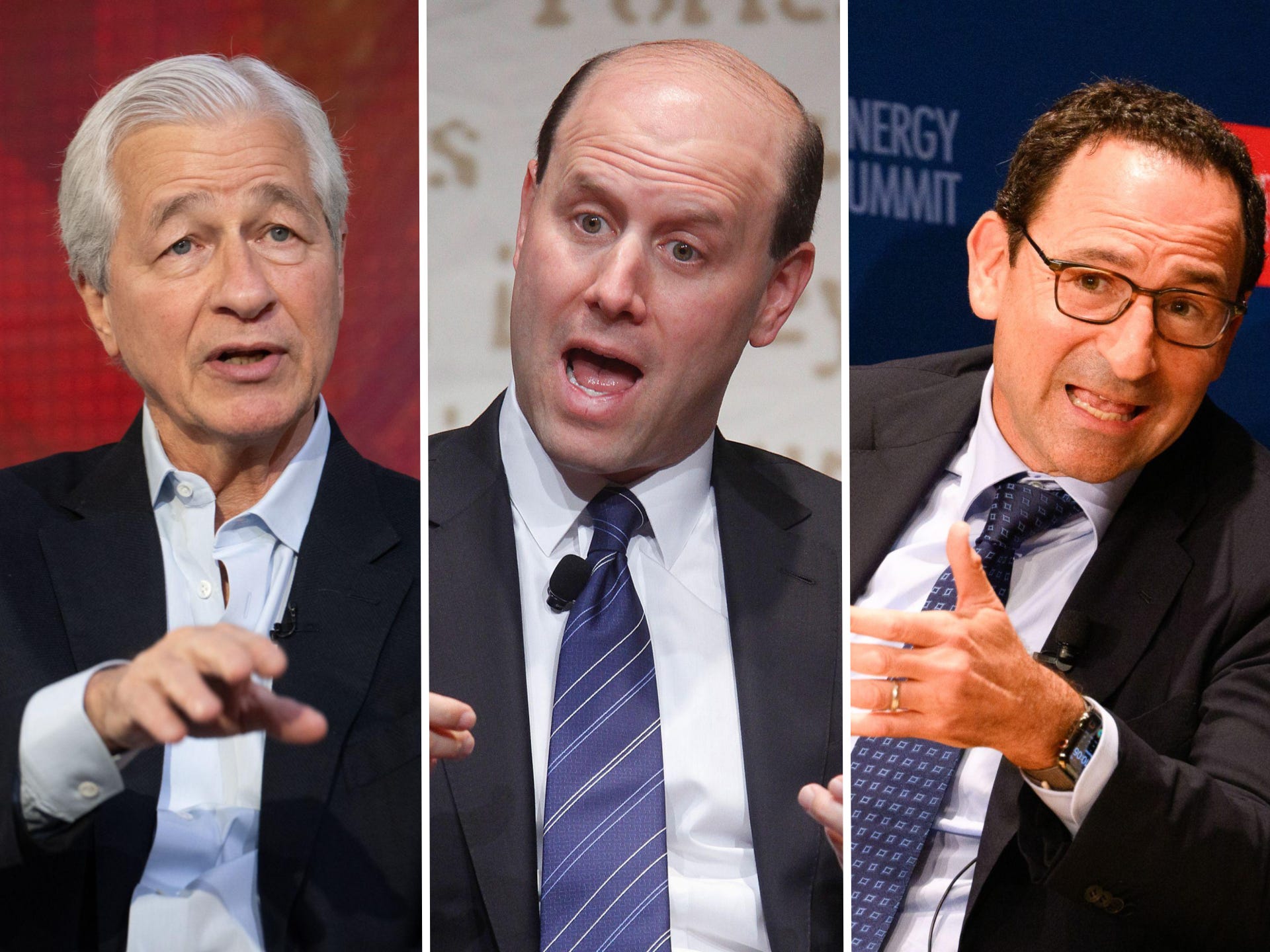
Noam Galai/Getty Images/Carlo Allegri/Reuters/Jeff Swensen/Getty Images
- Jamie Dimon’s concern over “cockroaches” in credit has spawned a debate about private credit.
- While some industry watchers sound the alarm on the booming industry, others are more sanguine.
- Many industry leaders defended private credit this week following Dimon’s comments.
This week, the world’s leading financial institutions were acting like bad roommates. All it took was one multibillion-dollar “cockroach” for everyone to start pointing fingers and assigning blame.Two years ago, Blackstone’s President Jon Gray said private credit was in a “golden moment,” and it has since become the hottest corner of Wall Street. There have always been private credit critics, but a deluge of digs from industry watchers turned the spotlight back on the so-called shadow lenders, challenging their shining narrative and raising uncomfortable questions about potential contagions.It kicked off on Tuesday, when Jamie Dimon, Wall Street’s bluntest banking billionaire, said something he “probably shouldn’t say,” about the bankruptcies of auto parts giant First Brands and subprime auto lender Tricolor during JPMorgan Chase’s earnings call.”When you see one cockroach, there’s probably more,” Dimon said, after the bank disclosed a $170 million loss related to Tricolor.And even though Dimon clarified that Tricolor, a company that offered financing for used cars to customers with limited or no credit history, is not typically what one would consider private credit (and may even involve fraud) and that there are “early signs” that there may be “some excess” in this 15-year credit bull market more broadly, many of the biggest private credit players took the comments from their longtime critic personally.Blue Owl co-CEO Marc Lipschultz suggested that the focus on private credit may be a result of some people in the industry having their own “meaningful, parochial interests” to protect in the face of private credit’s growing popularity, which is eating their lunch.”Blackstone’s market cap exceeds the market cap of most financial institutions in the world today,” he said at the CAIS Alternative Investment Summit conference. “It’s not as if that’s not coming from someone, and of course, those people don’t like it.”When the interviewer, Bloomberg TV’s Dani Burger, suggested “those people” might be Dimon, Lipschultz smirked. He suggested that the focus on private credit in these cases is an “odd kind of fear-mongering.”
The pile on
On Thursday, two regional banks, Zion Bancorp and Western Alliance, revealed losses in their own lending books, which has added to fears that the credit ecosystem might be under threat.
And critiques of private credit continued to pile up from there.
A study by business school academics at Johns Hopkins and UC Irvine claimed the industry’s returns are “illusory” and fail to beat the market, or make the lack of liquidity worthwhile. And at the International Monetary Fund’s annual meeting, the organization’s head, Kristalina Georgieva, told reporters that the significant growth of non-bank lending has her organization “urging more attention to the non-bank financial institutions,” which are less regulated than banks.
“You are asking the question that keeps me awake every so often at night,” she said.
Jeff Hooke, an adjunct instructor at Hopkins, told Business Insider that his study doesn’t suggest that private credit is about to cause a crisis, but it’s not favorable to the industry’s narrative either.
“I don’t see a few bankruptcies as a prelude to contagion,” Hooke said. “What my colleagues and I concluded is simply that the value that private credit claims for its asset class is simply not there.”
The golden age of private credit
Private credit, shorthand for non-bank lenders that have moved in to offer the loans that banks stopped underwriting after the Great Financial Crisis, has grown immensely since the bottom of the crisis.
They’re not just competing with banks on risky loans, but also writing multi-billion-dollar loans to investment-grade clients, a practice known as direct lending. Already booming before interest rates began to rise in 2022, the segment became the star of the investment world, offering high returns while banks pulled back.
Some of the private equity industry’s most famous firms now actually manage more debt than private equity, with Blackstone managing $407 billion in non-real estate credit and $389 billion in private equity as of Q2 of this year. Apollo is even more lopsided, with $690 billion in credit assets and $150 billion in equity strategies. It’s gone from a sleepier sidekick of the private equity investment world to a destination career for many future Wall Streeters.In a report titled “Has the Golden Age of Private Credit Lost its Shine?”, private market investors Hamilton Lane asked whether the good days are over. Its analysis suggested that there’s still “room to run” in the golden age, but the fact that they have to answer concerns shows that questions abound.Glenn Schorr, an analyst for Evercore who covers JPMorgan and large alternative investing firms, said that a few bankruptcies are not the same as an impending financial crisis, and that some people may have “misread” Jamie’s comments.
“Every indication from bank commentary, from alternative asset firms’ commentary, and from Moody’s head of private credit, tells you that we’re not seeing signs of a turn in credit,” Schorr said.
“Make no mistake about it, that does not mean there will be zero loss,” he added. “If defaults go up 1% to 2%, one person might say ‘big deal — 2% defaults are low’. Other people can say defaults have doubled.”
Coming to the defense of private debt
When Apollo CEO Marc Rowan was asked at a conference on Tuesday about the two bankruptcies, he said that it “does not surprise” him that there are some “late-cycle accidents.” He suggested that the “competitive market” may have led some to take “shortcuts.”
Rowan implied that this may be a sign of where the market stands, rather than a sign of any imminent concerns about the overall public or private credit markets. Other executives were more explicit in defending private credit.
“What’s interesting is both of those were bank-led processes,” Blackstone’s Gray said at the same conference. He said he does not think “this was a canary in the coal mine.” The firm is reporting results next week and may expand on this further then.
Also at CAIS, Carlyle Group CEO Harvey Schwartz noted that neither bankruptcies are related to “what you think of as direct lending or the traditional private credit market.”
And while the big publicly traded alternative investment providers have taken a beating due to credit concerns, banks have had their own set of woes.
Jefferies, which holds debt tied to First Brands, saw its stock slump as questions mounted on what went wrong — though it clawed back some ground Friday.
Zions Bancorp dropped 11% Thursday after revealing a $50 million loss on two commercial loans, and Western Alliance slid 10% after disclosing a lawsuit alleging a fraudulent credit line to Cantor Group V LLC. Both stocks have since recovered.
To hear the private credit industry tell it, there aren’t nearly as many cockroaches in their own loan books.
“We’ve been a little surprised by the First Brands, Tricolor sell-off and buzz because when we look at our credit portfolios, we actually see pretty healthy portfolios relative to almost any metric that you can look at,” Kipp deVeer, co-president of Ares, said during a panel at CAIS.
Maybe shadow banks aren’t so shadowy after all, they said.
“Private markets get referred to often as sort of like the shadow,” Carlyle’s Schwartz said during his panel. “I’ve never seen a shadow this bright ever in the history of time.”
Read the original article on Business Insider
The post ‘Cockroach’ jabs and regional bank breakdowns: The week private credit’s ‘golden’ narrative got a little less shiny appeared first on Business Insider.




